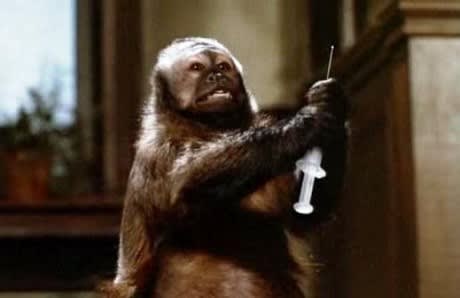Having a knack for modifying his style to reflect the times, George Romero's late '80s adaptation of the Michael Stewart novel, Monkey Shines, itself an admonitory for the dangers of playing God, is very much a testament to the era. With soft focus, high-waist jeans, cheap melodrama, overacting and a bizarrely executed Judeo-Christian ethos, this horror-thriller is more visibly a work of Republican-era superficiality than something of auteur relevance for the renowned Night of the Living Dead director.
But looking beneath the surface of teased-hair and creepy implications of bestiality, this unintentionally amusing throwaway work draws on social issues of animal experimentation, which, at the time, was a hot button topic, much like consumerism (Dawn of the Dead), military presence (Day of the Dead) and an instant gratification, "reality," ethos (Diary of the Dead) defined Romero's other works.
Here, in ersatz Dean Koontz fashion, an athlete, or "Superman" (Jason Beghe), is hit by a van (in dramatic '80s slow motion) and left quadriplegic, manoeuvring his way around in a wheelchair with a mouth-operated controller. Rushing through his depression and inevitable attempts at suicide after his wife (Janine Turner) leaves him for his doctor (Stanley Tucchi), we're thrust into the narrative impetus when his experimental scientist buddy (John Pankow) brings him a monkey—that has been injected with human brain shavings—to help feed and look after him. Trained by a comely monkey enthusiast (Kate McNeil) with a nine-inch zipper on her jeans, little Ella (the monkey) takes a romantic liking to her owner and starts to act out his violent fantasies when she develops a Watchers-like psychic link with him.
Beyond the amusement of a psychic monkey with a sexual fixation on a quadriplegic man, a romance develops between the monkey trainer and our protagonist—who eventually grows monkey fangs as shown in repeat close-up—culminating in a steamy sex scene where he lies motionless as she puts her breasts and genitals in his mouth. Since it's the '80s, she flips her hair around and opens her mouth a lot.
Even though this astoundingly bizarre and inappropriate work is contextually ideal for modern day drinking day derision, Romero's social criticism still holds some relevance, noting that the monkey—while technically the villain—is the ultimately victim of human ego. In such, this work fits into Romero's lexicon well, questioning the motivations and lack of self-awareness in dominant culture.
Monkey Shines screens at 9pm on November 2nd, 2012 at the TIFF Bell Lightbox as part of the George A. Romero retrospective. On October 31st, 2012 at 7pm, there's also an "In Conversation" session at the TIFF Bell Lightbox with the legendary director himself.
(MGM)But looking beneath the surface of teased-hair and creepy implications of bestiality, this unintentionally amusing throwaway work draws on social issues of animal experimentation, which, at the time, was a hot button topic, much like consumerism (Dawn of the Dead), military presence (Day of the Dead) and an instant gratification, "reality," ethos (Diary of the Dead) defined Romero's other works.
Here, in ersatz Dean Koontz fashion, an athlete, or "Superman" (Jason Beghe), is hit by a van (in dramatic '80s slow motion) and left quadriplegic, manoeuvring his way around in a wheelchair with a mouth-operated controller. Rushing through his depression and inevitable attempts at suicide after his wife (Janine Turner) leaves him for his doctor (Stanley Tucchi), we're thrust into the narrative impetus when his experimental scientist buddy (John Pankow) brings him a monkey—that has been injected with human brain shavings—to help feed and look after him. Trained by a comely monkey enthusiast (Kate McNeil) with a nine-inch zipper on her jeans, little Ella (the monkey) takes a romantic liking to her owner and starts to act out his violent fantasies when she develops a Watchers-like psychic link with him.
Beyond the amusement of a psychic monkey with a sexual fixation on a quadriplegic man, a romance develops between the monkey trainer and our protagonist—who eventually grows monkey fangs as shown in repeat close-up—culminating in a steamy sex scene where he lies motionless as she puts her breasts and genitals in his mouth. Since it's the '80s, she flips her hair around and opens her mouth a lot.
Even though this astoundingly bizarre and inappropriate work is contextually ideal for modern day drinking day derision, Romero's social criticism still holds some relevance, noting that the monkey—while technically the villain—is the ultimately victim of human ego. In such, this work fits into Romero's lexicon well, questioning the motivations and lack of self-awareness in dominant culture.
Monkey Shines screens at 9pm on November 2nd, 2012 at the TIFF Bell Lightbox as part of the George A. Romero retrospective. On October 31st, 2012 at 7pm, there's also an "In Conversation" session at the TIFF Bell Lightbox with the legendary director himself.
